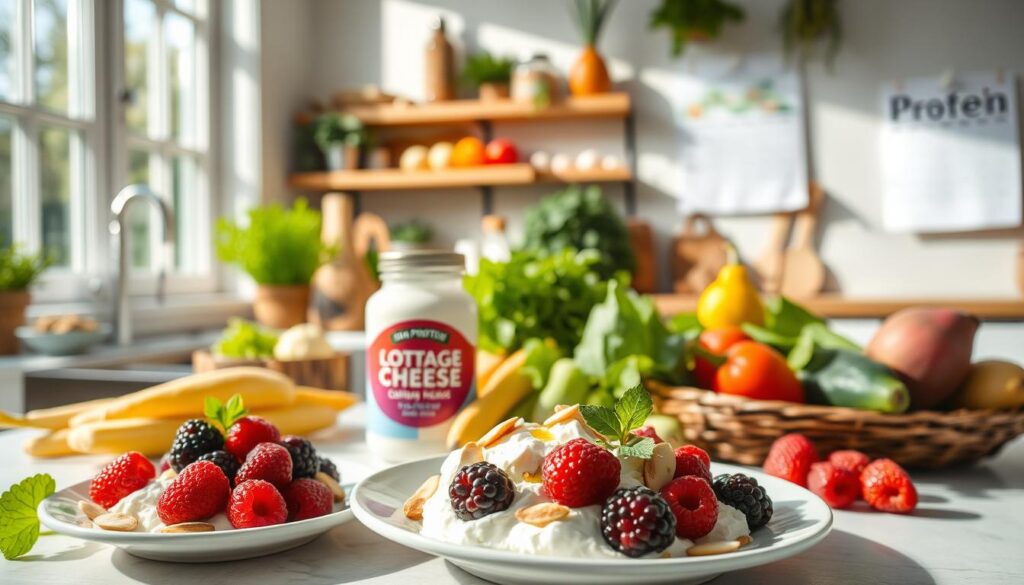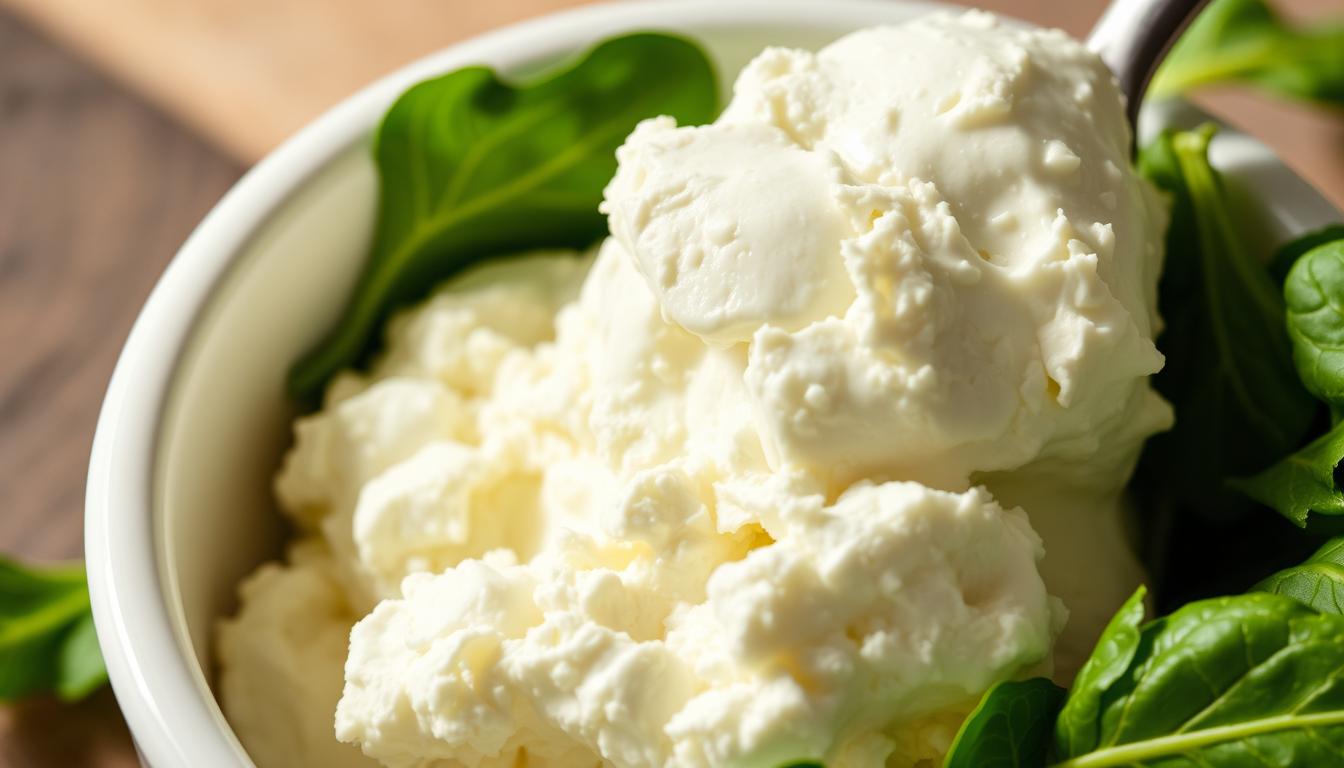High-Protein Cottage Cheese: A Delicious and Healthy Choice
Incorporating protein-rich foods into your diet can have a significant impact on your overall health and wellbeing. One such food that has gained popularity in recent years is cottage cheese, a nutrient-dense dairy product that is not only delicious but also packed with nutrients.
As a versatile ingredient, high-protein cottage cheese can be easily incorporated into a variety of dishes, from breakfast bowls to salads and smoothies. Its creamy texture and mild flavor make it a great addition to a healthy diet, providing a boost of protein to help keep you full and satisfied throughout the day.
Key Takeaways
- Incorporating high-protein cottage cheese into your diet can support overall health and wellbeing.
- Cottage cheese is a nutrient-dense dairy product that is rich in protein and versatile in its uses.
- Adding cottage cheese to your meals can help increase protein intake and support a healthy diet.
- High-protein cottage cheese is a great addition to breakfast bowls, salads, and smoothies.
- Cottage cheese can help keep you full and satisfied throughout the day.
What Makes Cottage Cheese a High-Protein Food
Understanding what makes cottage cheese high in protein reveals its nutritional benefits. Cottage cheese is a nutrient-rich food that has gained popularity due to its high protein content, making it an excellent choice for those looking to increase their protein intake.
The Protein Content of Cottage Cheese
Cottage cheese is known for its high protein content, which is essential for muscle repair and growth. The protein in cottage cheese is primarily made up of two types: casein and whey.
Complete Protein Profile
Cottage cheese has a complete protein profile, meaning it contains all nine essential amino acids that the body cannot produce on its own. This makes it an excellent protein source for individuals looking to support muscle health and overall nutrition.
Casein vs. Whey Content
The protein in cottage cheese is predominantly casein, which is a slow-digesting protein that provides a sustained release of amino acids. It also contains whey, a fast-digesting protein that helps in quick muscle recovery.
How It Compares to Other Dairy Products
When compared to other dairy products, cottage cheese stands out due to its high protein and low carbohydrate content. For instance, a cup of cottage cheese typically contains more protein than a cup of milk or yogurt, making it a more efficient protein source.
In conclusion, the high protein content, complete protein profile, and the presence of both casein and whey make cottage cheese an excellent dietary choice for those seeking to increase their protein intake.
The Nutritional Profile of High-Protein Cottage Cheese
The nutritional profile of high-protein cottage cheese makes it a valuable component of a healthy diet. It is rich in essential nutrients that support various bodily functions, from muscle maintenance to bone health.
Macronutrients Breakdown
High-protein cottage cheese is characterized by its high protein content, moderate fat, and relatively low carbohydrate levels. Understanding the macronutrient breakdown is crucial for appreciating its nutritional value.
Protein Content by Serving
A typical serving of high-protein cottage cheese (about 1 cup or 220g) contains approximately 28-30 grams of protein. This high protein content is essential for muscle repair, growth, and overall body health.
Fat and Carbohydrate Content
The fat content in cottage cheese can vary, with some varieties being low-fat or non-fat, while others may contain a higher fat percentage. Generally, a serving contains around 0-5g of fat and 5-8g of carbohydrates, making it a relatively low-carb dairy product.
Vitamins and Minerals
Beyond its macronutrient profile, high-protein cottage cheese is also a rich source of various vitamins and minerals that are vital for overall health.
Calcium and Phosphorus
Cottage cheese is an excellent source of calcium, with a single serving providing a significant percentage of the daily recommended intake. It is also a good source of phosphorus, a mineral that works closely with calcium to support bone health.
B Vitamins and Other Micronutrients
In addition to calcium and phosphorus, cottage cheese contains several B vitamins, including B12, riboflavin (B2), and folate. These micronutrients play crucial roles in energy production, nerve function, and the formation of red blood cells.
Some key nutritional values per serving (1 cup or 220g) of high-protein cottage cheese include:
- Protein: 28-30g
- Fat: 0-5g
- Carbohydrates: 5-8g
- Calcium: 10-15% of the Daily Value (DV)
- Phosphorus: 15-20% of the DV
- Vitamin B12: 20-25% of the DV
Health Benefits of High-Protein Cottage Cheese
With its rich nutritional profile, high-protein cottage cheese is associated with several health benefits. It is an excellent source of protein, making it a valuable component of a healthy diet.
Muscle Building and Recovery
High-protein cottage cheese is particularly beneficial for individuals looking to build or repair muscle tissue. The protein content helps in promoting muscle growth and recovery after exercise. Adequate protein intake is essential for athletes and fitness enthusiasts as it supports muscle protein synthesis, a critical process for muscle recovery and growth.
- Provides essential amino acids necessary for muscle repair
- Supports muscle protein synthesis
- Aids in recovery post-workout
As noted by a study published in the Journal of the International Society of Sports Nutrition, “consuming protein-rich foods like cottage cheese can help in optimizing muscle recovery and growth.”
Weight Management Support
High-protein cottage cheese can also be a valuable ally in weight management. The protein helps in keeping you fuller for longer, reducing the likelihood of overeating. Additionally, protein requires more energy to digest than carbohydrates or fat, which can increase metabolism and support weight loss efforts.
Key benefits for weight management include:
- Promotes satiety, reducing overall calorie intake
- Boosts metabolism due to higher energy expenditure during digestion
- Supports a healthy metabolic rate
Bone Health Benefits
Cottage cheese is also a good source of calcium, a mineral crucial for bone health. Consuming high-protein cottage cheese can contribute to maintaining strong bones and reducing the risk of osteoporosis, particularly in older adults.
Regular consumption of calcium-rich foods like cottage cheese is associated with:
- Improved bone density
- Reduced risk of fractures
In conclusion, high-protein cottage cheese offers a range of health benefits, from supporting muscle building and recovery to aiding in weight management and promoting bone health. Incorporating it into your diet can be a nutritious and delicious way to enhance your overall well-being.
Different Types of High-Protein Cottage Cheese
Cottage cheese, a staple in many health-conscious diets, is available in several types, catering to different tastes and nutritional requirements. This variety ensures that consumers can choose a product that aligns with their dietary goals and preferences.
Fat Content Varieties
The fat content in cottage cheese can vary significantly, offering consumers a range of options.
Full-Fat Options
Full-fat cottage cheese is rich and creamy, making it a favorite among those who prefer a more traditional dairy taste. It is ideal for recipes where a richer texture is desired.
Low-Fat and Fat-Free Varieties
For those watching their fat intake, low-fat and fat-free cottage cheese options are available. These versions are perfect for health-conscious individuals who still want to enjoy the benefits of cottage cheese without the extra fat.
Flavored vs. Plain Options
Cottage cheese also comes in flavored and plain varieties, giving consumers the flexibility to choose based on their taste preferences.
Common Flavor Additions
Flavored cottage cheese can include a range of additions such as fruit, vanilla, or cinnamon, enhancing its taste and making it more enjoyable as a snack or dessert.
Sweetened vs. Unsweetened
Some cottage cheese products are sweetened, while others remain unsweetened. Unsweetened varieties offer a more versatile option for those who prefer to control the amount of sugar in their diet.
With such a wide range of high-protein cottage cheese types available, consumers can easily find a product that fits their dietary needs and taste preferences. Whether you prefer full-fat or low-fat, flavored or plain, there’s a cottage cheese option for everyone.
How High-Protein Cottage Cheese Is Made
The creation of high-protein cottage cheese involves a detailed process that includes curd formation, separation, and quality control measures. This process combines traditional techniques with modern manufacturing methods to produce a high-quality product.
Traditional Production Methods
Traditionally, cottage cheese is made by allowing milk to curdle, then separating the curds from the whey. This process involves adding a bacterial culture or rennet to milk, causing it to coagulate. The curds are then cut into small pieces to release more whey, and the mixture is cooked gently to firm up the curds.
Modern Manufacturing Processes
Modern manufacturing processes have streamlined the production of cottage cheese while maintaining its nutritional integrity. Advanced technology is used to control temperature, pH levels, and other factors that affect curd formation and quality.
Curd Formation and Separation
Curd formation is a critical step in cottage cheese production. The curds are formed by coagulating milk with bacterial culture or rennet. Once the curds have formed, they are cut and cooked to separate them from the whey, resulting in a creamy, high-protein cheese.
Quality Control Measures
Quality control is paramount in the production of cottage cheese. Manufacturers implement rigorous testing to ensure the product meets high standards of taste, texture, and nutritional content. This includes checking for contaminants and verifying protein content.
Incorporating High-Protein Cottage Cheese Into Your Diet
With its rich nutritional profile, high-protein cottage cheese is a versatile food that can be easily integrated into various meals. Incorporating this dairy product into your diet can enhance your overall health and fitness goals. Whether you’re looking to boost your protein intake or simply add some variety to your meals, high-protein cottage cheese is an excellent choice.

Breakfast Ideas
Starting your day with a high-protein breakfast can be both satisfying and beneficial for your muscles. Consider mixing high-protein cottage cheese with fruit such as berries or sliced peaches for a delicious and nutritious breakfast. You can also add some granola for extra crunch.
Lunch and Dinner Applications
High-protein cottage cheese can be a great addition to your lunch or dinner. Use it as a topping for salads, or mix it with herbs and spices as a dip for vegetables. It can also be incorporated into pasta dishes or used as a filling in stuffed shells.
Snack Suggestions
Snacking on high-protein cottage cheese can help curb hunger and support muscle recovery. Here are some ideas:
- Combine it with fruit for a sweet treat
- Use it as a base for dips with vegetables
Pre-Workout Options
Consuming high-protein cottage cheese before a workout can provide your muscles with the necessary amino acids. Try having it with some complex carbohydrates like whole-grain toast.
Post-Workout Recovery
After a workout, high-protein cottage cheese can aid in recovery by supplying your muscles with protein. Mixing it with some banana or honey can make for a quick and effective recovery snack.
Delicious High-Protein Cottage Cheese Recipes
Exploring the world of high-protein cottage cheese recipes can add a delicious twist to your daily meals and snacks. Cottage cheese is not only a great source of protein, but it’s also versatile and can be incorporated into a variety of dishes, ranging from sweet breakfast bowls to savory dips and main courses.
Sweet Recipes
Sweet recipes featuring high-protein cottage cheese are perfect for breakfast or as a healthy dessert option. Two popular categories include breakfast bowls and parfaits, as well as desserts and treats.
Breakfast Bowls and Parfaits
Starting your day with a high-protein breakfast can be both delicious and nutritious. Try layering cottage cheese with fresh fruits, granola, and a drizzle of honey for a satisfying breakfast bowl. Alternatively, create a parfait by stacking cottage cheese, berries, and nuts in a glass for a visually appealing and healthy breakfast.
Desserts and Treats
Cottage cheese can also be used to make healthier dessert options. For instance, blending cottage cheese with fruit and a touch of sweetener can create a creamy and guilt-free dessert. You can also use it as a base for cheesecakes or as a topping for pancakes and waffles.
Savory Recipes
On the savory side, high-protein cottage cheese can be used in a variety of dishes, from dips and spreads to main dishes and sides.
Dips and Spreads
Mixing cottage cheese with herbs and spices can result in a tasty dip for vegetables or crackers. It’s also a great base for spinach and artichoke dip, adding a protein boost to your snack.
Main Dishes and Sides
Cottage cheese can be incorporated into main dishes like lasagna or used as a side dish when mixed with chopped vegetables and a sprinkle of paprika. It’s a versatile ingredient that can enhance both the protein content and the texture of various dishes.
Here’s a simple table showcasing some high-protein cottage cheese recipe ideas:
| Recipe Type | Main Ingredients | Protein Content |
|---|---|---|
| Breakfast Bowl | Cottage Cheese, Fresh Fruits, Granola | 28g |
| Savory Dip | Cottage Cheese, Herbs, Spices | 25g |
| Lasagna | Cottage Cheese, Lasagna Noodles, Tomato Sauce | 30g |
These recipes not only showcase the versatility of high-protein cottage cheese but also highlight its potential to enhance the nutritional value of various meals and snacks. Whether you’re looking for sweet or savory options, incorporating cottage cheese into your diet can be a delicious and healthy choice.
Cottage Cheese vs. Other Protein Sources
Cottage cheese has been a staple in many diets for its high protein content, but how does it stack up against other protein sources? As consumers become more health-conscious, understanding the nuances between different protein options is essential for making informed dietary choices.

Cottage Cheese vs. Greek Yogurt
Both cottage cheese and Greek yogurt are popular dairy-based protein sources. However, they have distinct nutritional profiles. Cottage cheese generally contains more protein and less sugar than Greek yogurt, making it an attractive option for those looking to maximize protein intake while minimizing sugar consumption. On the other hand, Greek yogurt often has a creamier texture and may be more versatile in certain recipes.
Cottage Cheese vs. Plant-Based Proteins
Plant-based proteins, such as pea protein and rice protein, have gained popularity among those following vegan or vegetarian diets. Compared to cottage cheese, many plant-based proteins are lower in certain nutrients like calcium and vitamin B12, which are abundant in dairy products. However, plant-based options are often more environmentally friendly and can be easier to digest for some individuals. Cottage cheese, with its high protein and dairy nutrient content, remains a valuable choice for those who consume dairy.
Cottage Cheese vs. Protein Supplements
Protein supplements, including powders and bars, offer convenience for boosting protein intake. While they can be effective, they often lack the additional nutrients found in whole foods like cottage cheese. Cottage cheese provides not only protein but also calcium, phosphorus, and other essential nutrients, making it a more nutritious choice for those seeking a natural protein source.
Who Should Include High-Protein Cottage Cheese in Their Diet
Incorporating high-protein cottage cheese into one’s diet can be particularly advantageous for certain individuals. This nutrient-rich food offers a range of benefits that can cater to different needs and lifestyles.
Athletes and Fitness Enthusiasts
Athletes and fitness enthusiasts can greatly benefit from the high protein content in cottage cheese. Protein is essential for muscle repair and growth, making it a crucial component of an athlete’s diet.
Endurance Athletes
Endurance athletes, such as long-distance runners or cyclists, require a sustained release of energy and protein to support their prolonged activities. High-protein cottage cheese can provide the necessary nutrients to support their performance and recovery.
Strength Training and Bodybuilding
For those engaged in strength training and bodybuilding, high-protein cottage cheese is an excellent choice. It provides the necessary building blocks for muscle growth and repair, helping athletes to achieve their goals more effectively.
Weight Management and Health-Conscious Individuals
Individuals focusing on weight management can also benefit from incorporating high-protein cottage cheese into their diet. The protein content helps to keep you fuller for longer, reducing the likelihood of overeating.
Dietary Considerations
When considering high-protein cottage cheese, it’s essential to look at the overall dietary context. Choosing low-fat or non-fat versions can be beneficial for those watching their calorie intake.
Potential Allergens and Sensitivities
While high-protein cottage cheese is generally considered safe, individuals with dairy allergies or sensitivities should exercise caution. There are also lactose-free options available for those who are lactose intolerant.
In conclusion, high-protein cottage cheese is a versatile food that can benefit a wide range of individuals, from athletes to those managing their weight. By understanding the benefits and considerations, one can make informed choices about incorporating this nutritious food into their diet.
Top Brands of High-Protein Cottage Cheese in the US
The US market offers a diverse range of high-protein cottage cheese brands, catering to various consumer preferences and dietary needs. From traditional to specialty and artisanal options, there’s a brand for everyone.
Traditional Cottage Cheese Brands
Traditional cottage cheese brands have been a staple in American grocery stores for decades. They offer a range of products that are both affordable and of high quality.
Nationwide Options
Nationwide brands such as Daisy and Friendship are widely available and trusted by consumers. They offer a classic cottage cheese experience with various fat content options.
Regional Favorites
Some regional brands, like Good Culture, have gained popularity for their unique flavors and high-protein content, appealing to local tastes.
Specialty and Artisanal Options
The rise of specialty and artisanal cottage cheese brands has introduced consumers to new and exciting products. These brands often focus on unique ingredients and production methods.
Organic and Grass-Fed Varieties
Brands like Organic Valley offer organic and grass-fed cottage cheese options, appealing to consumers looking for more natural and sustainable products.
Innovative New Products
Innovative brands are introducing new flavors and textures, such as Siggi’s high-protein cottage cheese with unique flavor profiles.
| Brand | Type | Protein Content |
|---|---|---|
| Daisy | Traditional | 28g per cup |
| Good Culture | Regional | 30g per cup |
| Organic Valley | Organic | 29g per cup |
Conclusion
As we’ve explored throughout this article, high-protein cottage cheese is a nutritional powerhouse that offers numerous health benefits. From its impressive protein content to its versatility in various recipes, it’s an ideal addition to a healthy diet.
Incorporating high-protein cottage cheese into your daily meals can support muscle building and recovery, aid in weight management, and promote overall well-being. With its rich nutritional profile and delicious taste, it’s an excellent choice for athletes, fitness enthusiasts, and health-conscious individuals alike.
By making high-protein cottage cheese a staple in your diet, you can experience the benefits firsthand. Whether you’re looking to boost your protein intake or simply seeking a nutritious and satisfying snack, high-protein cottage cheese is an excellent option. So, start exploring the world of high-protein cottage cheese today and discover a healthier, more balanced you.







